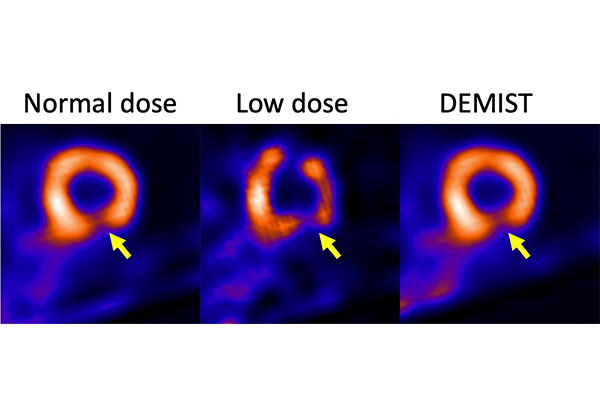Artificial Intelligence Tool Enhances Usability of Medical Images
Posted on 14 Jun 2024
Doctors use myocardial perfusion imaging (MPI) single-photon emission computed tomography (SPECT) images to evaluate blood flow to the heart muscle. To capture these images, patients are administered a dose of radioactive tracer and must remain still for up to 15 minutes during the scanning process. Reducing the dose of the tracer or the duration of the scan would be advantageous for patients, as it would streamline the procedure and reduce imaging costs. However, such reductions can also compromise the image quality, particularly in terms of visualizing cardiac defects, which is the primary clinical purpose of these images. Now, a deep-learning-based image denoising method has been developed that could enhance the detection of myocardial defects in low-count SPECT scans.
The tool developed by researchers at Washington University in St. Louis (St. Louis, MO, USA) for denoising MPI SPECT images demonstrates the potential to improve performance on clinical tasks. Drawing on insights into the human visual system, the team devised a deep-learning-based strategy tailored for denoising low-count MPI SPECT images, effectively improving their quality. The tool, named DEMIST, uses a deep learning framework to selectively refine MPI SPECT images, ensuring the preservation of essential features critical for detection tasks.

The effectiveness of DEMIST was evaluated using anonymized clinical data from 338 patients who underwent MPI procedures on two different scanners. The results demonstrated that DEMIST outperformed both the original low-dose scans and a widely-used task-agnostic denoising method in detecting cardiac defects. The denoised images by DEMIST significantly improved the detection of cardiac defects according to a model observer. This improvement was consistent across various patient demographics, including both male and female patients, and across different types of cardiac defects. It was also effective with data obtained from two distinct scanners. Further mathematical analysis confirmed that DEMIST effectively retained features vital for detection tasks, thereby boosting observer performance.
“These results provide evidence for future clinical evaluation of DEMIST's potential to denoise MPI SPECT images,” said biomedical engineer Abhinav Jha who led the research at WUSTL. “I am excited about these findings since we are seeing that AI may have the potential to enhance the usability of medical images. By providing the possibility to reduce radiation dose and acquisition time, DEMIST offers possibilities to enhance the accuracy and efficiency of detecting myocardial perfusion defects, ultimately benefiting patient care and treatment outcomes.”
Related Links:
WUSTL













